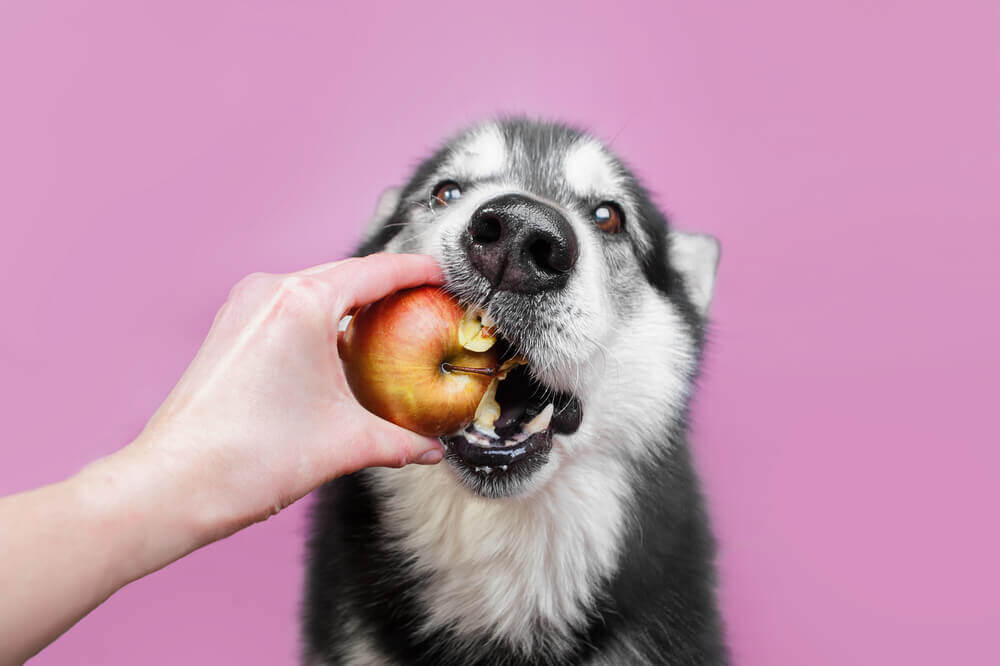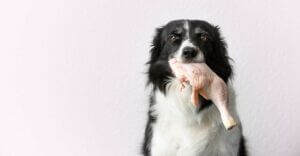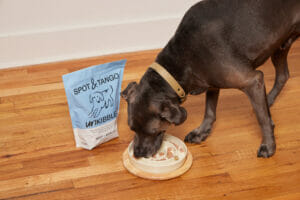Last updated: July 15, 2022
Imagine this: you just had a wonderful time playing tug or ball with your dog, and now you find yourself exhausted and hunting for a quick snack in the kitchen.
You grab yourself an apple, and as you bite into the juicy fruit, you glance at your dog and think to yourself, “Hmm…I wonder if my dog can have some as well. Can dogs eat apples?”
We’ve all heard it said: “An apple a day keeps the doctor away.” Rich in vitamins, fibers, minerals, and plenty of antioxidants, apples are one of the healthiest and most popular go-to snacks for people.
Nonetheless, you may still be asking yourself: “Can my dog eat apples too?” or “Are apples good for dogs?”. Learning what’s safe and not-so-safe for your dog to eat is a top responsibility for any pet parent.
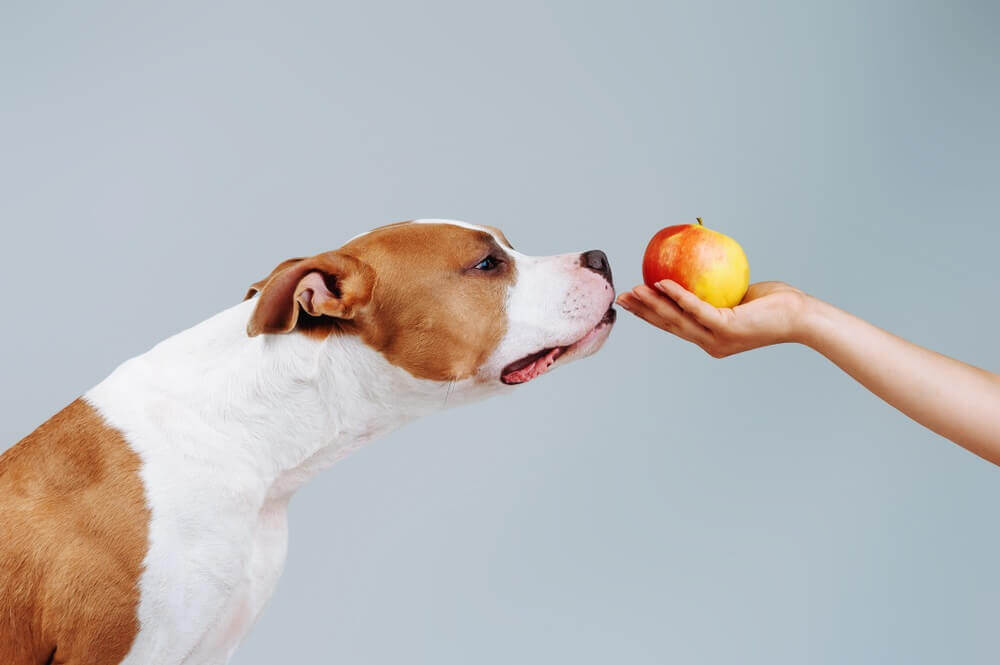
The simple answer to that question is a resounding yes! Dogs can eat apples. Still, before you hurry off to share your snack with your eager friend, there are a few things you must know.
There is a right way and a wrong way to feeding your pet apples. Keep reading to find out all you need to know about safely feeding your dog apples.
Are Apples Good For Dogs?
Your dog can enjoy and benefit from a variety of delicious and nutrient-rich fruits – including apples! The key to feeding your dog any kind of fruit is moderation. In the correct quantity, an apple can be good for your dog.
Why are apples good for dogs? Well, they have many of the same health benefits for dogs as they do for humans.
They are a perfect source of vitamins A, C, and K, which are valuable for a dog’s overall health. The vitamin A found in apples will help make your dog’s coat shiny and give him healthy skin. It is also essential for healthy vision.
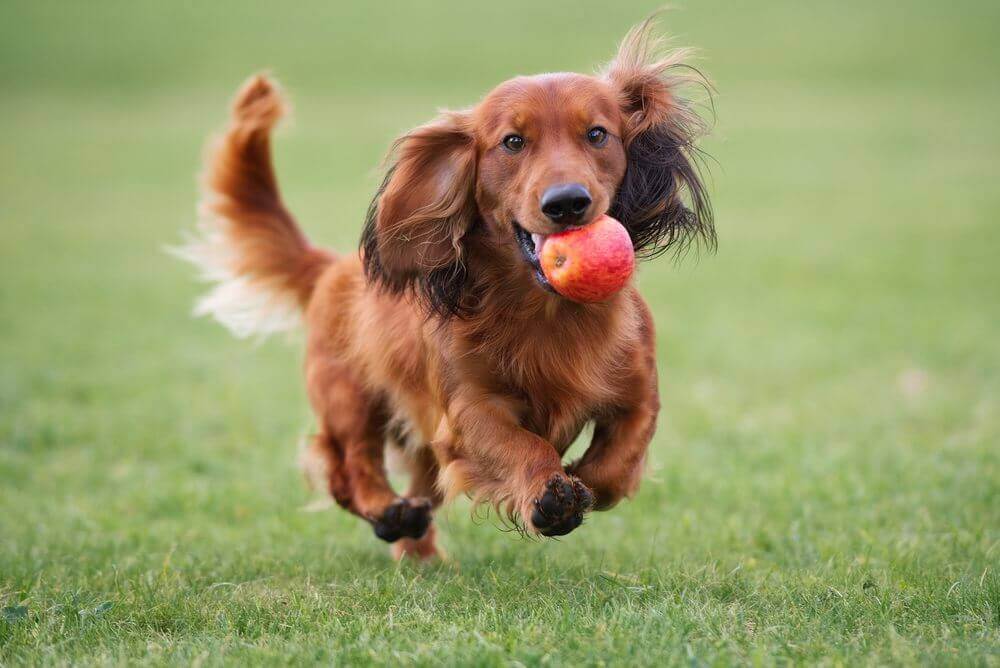
Vitamin C helps dogs to develop and maintain strong bones and muscles. This particular vitamin will also boost their immune system. Apples also contain vitamin K, which plays a role in blood clotting, bone metabolism, and regulating blood calcium levels.
Vitamins A, C, and K aren’t the only reasons why dogs should eat apples – there are more benefits to consider.
Other Benefits of Apples for Dogs
Instead of serving your dog a meaty snack or something else with additives, preservatives, and unhealthy fats in it, you can instead give your pet a slice of apple! Your dog will probably enjoy the change.
They are also great for helping dogs develop a healthy digestive system. Does your dog suffer with digestive problems such as diarrhea or constipation? Feeding your dog the occasional slice of apple may help ease the problem.
Apples are very high in fiber – a nutrient that aids both diarrhea and constipation. The soluble fiber called pectin in these fruits eases diarrhea by adding bulk to stools and promoting healthy bacteria in the gut.

In addition, the high fiber content keeps things moving quickly through the digestive system, helping to solve constipation. Adding the correct amount of fiber to your dog’s diet will improve their gastrointestinal health overall and normalize bowel movement.
Finally, apples contain plenty of antioxidants that lend themselves to good brain health and prolonged longevity. Antioxidants play a big role in preventing cancer and helping your dog to maintain healthy joints and bones. Apples also keep your dog’s teeth clean and can refresh their breath.
And of course, apples are fresh and affordable – something every pet parent looks for in a good dog treat.
Your dog can eat the fruit and benefit from it if you serve it the right way and in moderation, which brings us to the next question.
How Much Apple Can Dogs Have?
At this stage, you know that dogs can eat apples. But how much is too much, and how much is just enough?
While apples can help with gastrointestinal problems, they can also cause them if you give your dog too much. Eating too many apples can cause stomach aches and digestion problems.
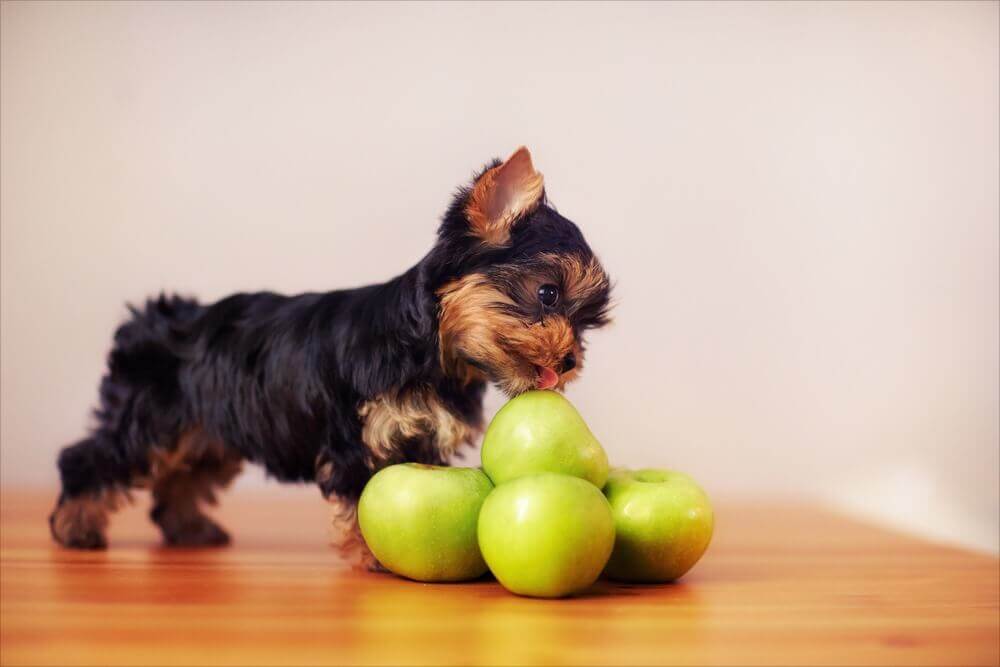
Since apples are not a complete and balanced food source, they should always be served as a supplement alongside a nutrient-dense, balanced, and complete food source.
Keep in mind that apples have a high fruit sugar content. Too much sugar, even in fruit, is not healthy for dogs. This is especially the case with dogs suffering from diabetes or cancer. Again, moderation is key.
How Should You Prepare Apple for Dogs?
If you plan to treat your dog to an apple, you certainly shouldn’t give a big one to your dog and let them eat the whole thing alone. While whole apples or big chunks can pose a choking hazard, you could also end up giving your dog too much, so always cut it into bite-sized pieces. Here’s how to prepare apple for dogs:
- First, make sure is the apple is washed and clean. Apples from the supermarket often contain pesticides and herbicides, which can be harmful.
- Core the apple and remove all the seeds.
- Cut the apple into small slices or chunks and give them to your dog.
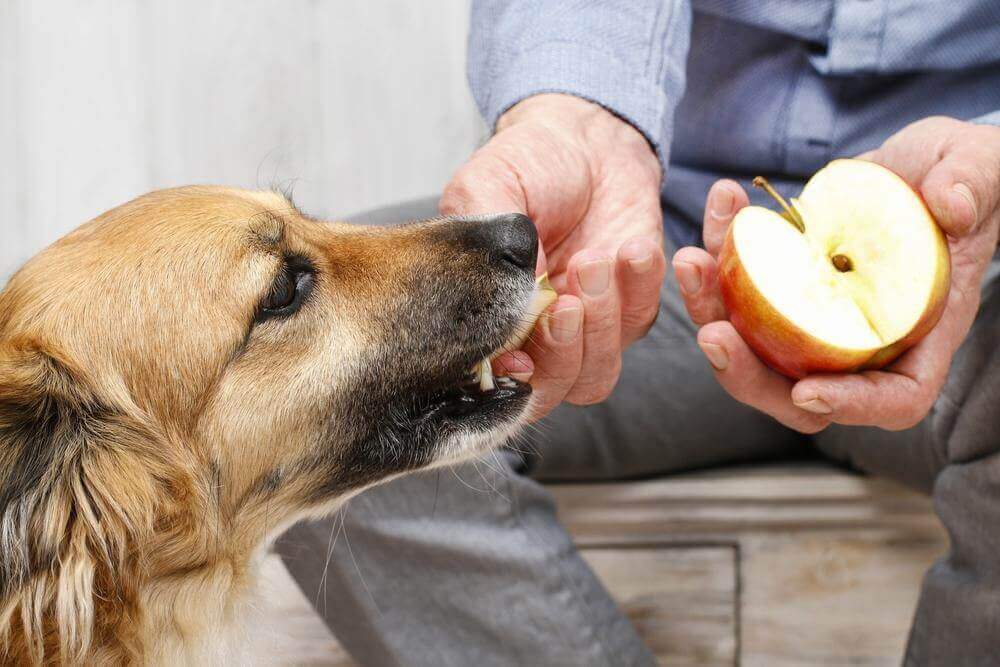
This is a good idea for those who want to feed their dog an apple as a snack. If you want your pet to benefit daily from the high vitamin content and fiber in apples, you can find dog food that contains apples – there are several in the Spot & Tango line!
Our Turkey and Red Quinoa recipe includes fresh apples, and is a complete and balanced meal to give to your pet daily.
Can Eating Apples Be Dangerous For My Dogs?
Can apples be dangerous to your dog? This is a question that begs to be answered.
The simple answer is yes – there are a few things to watch out for when feeding apples to dogs.
Apple seeds, stems and cores can be dangerous for dogs. Apple seeds contain a very small amount of a toxic substance called cyanide, which may cause poisoning if ingested in large quantities.
Of course, you won’t feed your dog a large number of apple seeds, but there’s a risk of illness if your dog finds access to a bag of apples and gets stuck in while you’re not around.
It’s also best if you remove the stem from the apple before giving it to your pup. Since the core is firm, your dog may have difficulty chewing on it or even choke on it.
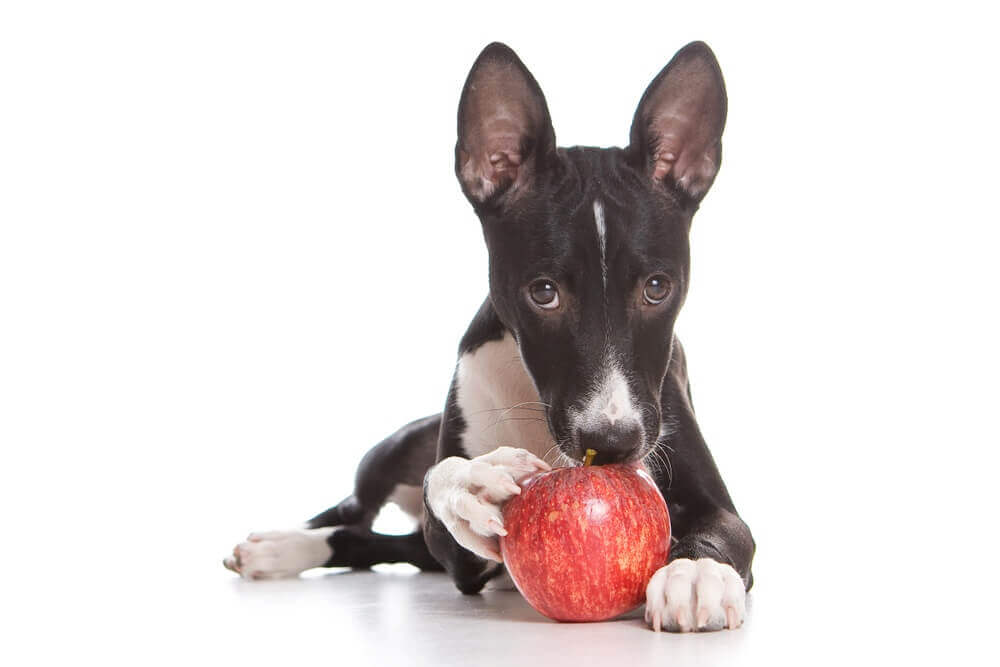
If your dog swallows an entire apple core, it may cause a blockage in the intestines. Taking time to ensure that the seeds, stems, and core are removed will prevent these dangers.
As with any other food, your dog may be allergic to apples. In most instances, the allergy is a mere irritation, but there are instances where apple has been lethal (causing anaphylaxis) to some dogs. Some signs of an allergic reaction include:
- Sneezing
- Swelling
- Hives
- Difficulty breathing
- Coughing
If you notice signs of an allergic reaction, stop giving the fruit to your dog immediately and contact your vet for advice. Also, ensure that you stop giving your dog any foods that contain this fruit as an ingredient. That said, it is important to note that unlike chicken allergies, apple allergies in dogs are quite rare.
Always watch out for two main things when giving apple to your dog: the core and the seeds. While the core can be a choking hazard or cause a blockage, the seeds often cause more concern for pet parents.
We’ve already touched on the fact that the seeds contain traces of a toxic element called cyanide, but now it‘s time to explain this in more detail. When an apple seed is chewed and broken, a small amount of cyanide is released.
The amount of cyanide in the seed is incredibly small, and it would take a lot of seeds to harm your dog, but it’s certainly not a good idea to expose your dog to them often.
You don’t have to worry that your dog might become poisoned just because they ingested a few seeds. However, due to the potential of possible toxicity, you don’t want to risk your dog’s health. Make removing the seeds a regular habit.
Apple skin is not harmful to dogs, and you can serve your dog the fruit peeled or unpeeled. However, make sure to wash your apples well, especially if you get them from the supermarket. Organic apples are the best if you want to avoid the possible ingestion of pesticides and herbicides from the skin.
Apple Recipes For Dogs
What are some delicious ways you can prepare apples for your pet? In the summer, you can freeze slices and cubes to make a refreshing snack. Or, you could add a few pieces of apple to your pup’s regular meal.
You can even make some sauce by mashing the apples, or if you have a little extra time, you can make a homemade smoothie by blending them with other fruits. Always ensure that you research each fruit before treating your dog to an apple smoothie.
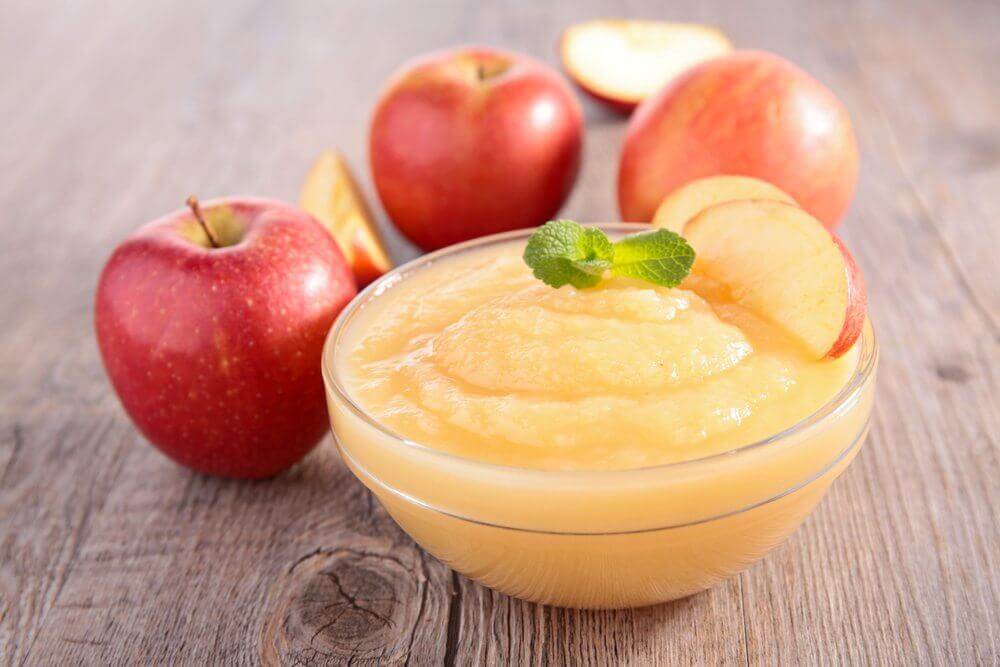
As we mentioned before, another way to feed your dog apples is by investing in dog food from the Spot & Tango range, which features human-grade ingredients with a little bit of apple for fiber and vitamins.
Both the fresh wet and dry dog food in the Spot & Tango range is specially formulated by veterinary nutritionists, to provide you with complete peace of mind that you’re giving your dog the very best.
Frequently Asked Questions
Q. Are apple seeds poisonous to dogs?
As mentioned earlier, apple seeds contain tiny amounts of a toxic substance called cyanide. Ingesting a few seeds will not harm your dog.
So don’t stress out if your dog just swallowed a few apple seeds. However, to avoid any risk, it is best to remove the seeds before serving your dog apples.
Q. Are apples bad for a dog’s teeth?
No, chewing apple can help clean your dog’s teeth and freshen his breath too. However, you should not use it as a substitute for proper dental care.
Q. Can dogs eat green apples?
Yes, dogs can eat red, yellow or green ones.
Q. Can dogs eat apple cores?
While dogs can eat the cores, it is best to avoid feeding them to your pet. The last thing you want is an intestinal blockage or to stand by helplessly while your dog chokes.
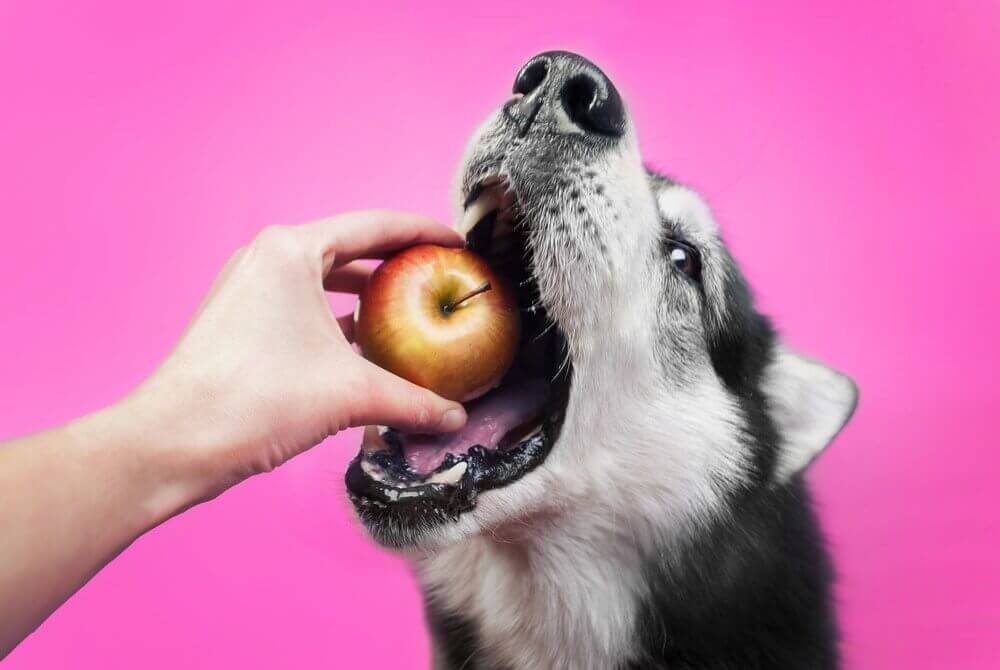
Q. Can dogs eat apple skin?
Yes, dogs can eat apple skin. Simply wash before serving.
Q. Are some dogs allergic to apples?
Some dogs may be allergic to these fruits. If you notice any signs of an allergic reaction, such as sneezing, coughing, swelling, hives, or difficulty breathing, contact your vet immediately.
Final Thoughts
The final consensus is that dogs can and should eat apple in moderation. In fact, it’s a nutritious and affordable snack that most dogs absolutely love.
Rich in vitamins, fiber and antioxidants, apples are a firm favorite for many pet owners. While portion size is important, you should feel confident that feeding your dog apple is a healthy way to treat your pet.
Visit the Spot & Tango website to create your dog’s personalized meal plan today, with or without apples in it. You can select multiple recipes and triple the choices for your pup’s diet!


